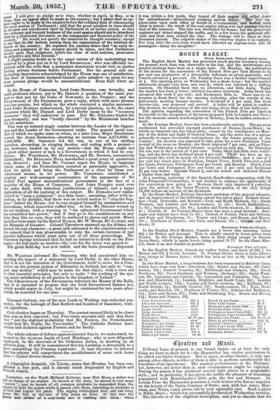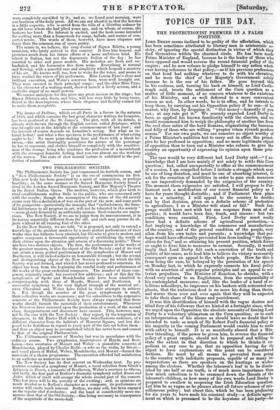tuttrto gulf 311tiffir.
If Drury Lane at present is our Grand Opera—or at least the only thing we have to show for it—the Haymarket has similar pretensions to be called our Opera Comiquo. But as opera, at either theatre, is only ono among other objects, neither of them is able to perform satisfactorily the functions of an operahouse. The musical performances at the Haymar- ket, however, are better than in such circumstances might be expected. During the season it has produced several light pieces in a respectable style ; and in particular, it has given the public the pleasure of becoming acquainted with Mendelssohn's little gem, the Son and Stranger. In Louisa Pyne the Haymarket possesses a vocal actress who has no superior on the boards of the Opera Comique of Paris ; and, with her sister, Har- rison, and Weiss, comic pieces can be very agreeably cast. Such a piece is White Magic; which was successfully produced on Wednesday evening.
The libretto is of the slightest description, and yet so obscure that we
were completely mystified by it ; and so, we found next Morning, were our brethren of the daily press. All we can say about it is, that the heroine is a little coquette, who Is saved from the toils of a libertine seducer by an old lover whom she had jilted years ago, and on whom, of course, she bestows her hand. No interest is excited, and the book seems intended for nothing more than a framework for songs, ballads, and scenes of con- certed music. The words of these, however, have more elegance and fancy than the common run of opera poetry. The music is, we believe the coup d'essai of Signor Biletta, a young musician, who lately arrived in this country. It does him honour, and promises much from his future efforts of a more ambitious kind. His school is Italian' but not the degenerate Italian of the day : he has resorted to older and purer models. His melodies are fresh and un- hackniecl, and his harmonies free from noise. Everything is natural -and flowing, with a graceful ease and simplicity which bespeak a mastery of his art. He knows well, too, how to write for the voice and seems to have studied the voices of his performers. Miss Louisa P;ne's clear and brilliant execution, and Weiss's sonorous bass, were well brought out. They were encored in their principal songs ; and the elder Miss Fyne, in the character of a waiting-maid, showed herself a lively actress, and a contralto singer of no small powers.
We cannot anticipate for this piece any great success on the stage ; but Signor Biletta's airs, duets, and trios will lose very little by being trans- ferred to the drawingroom, where their elegance and facility cannot fail to make them acceptable.



























 Previous page
Previous page